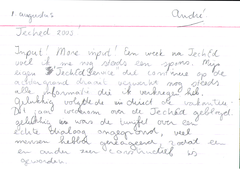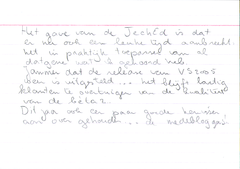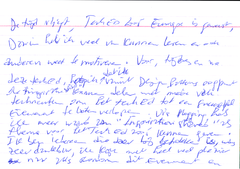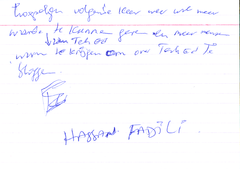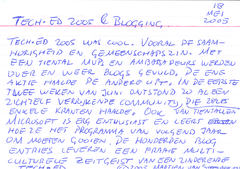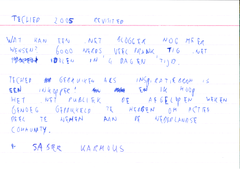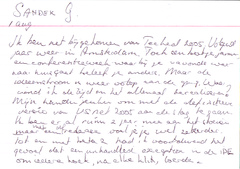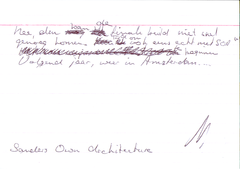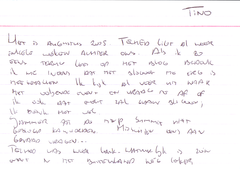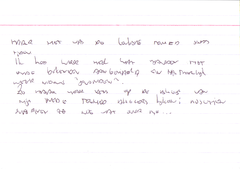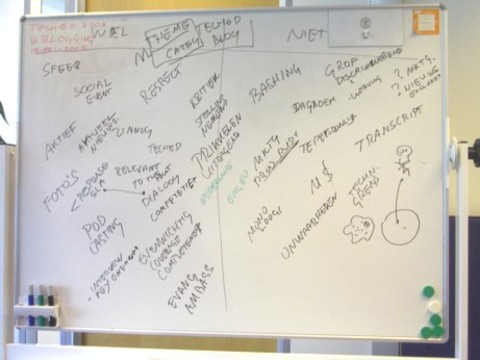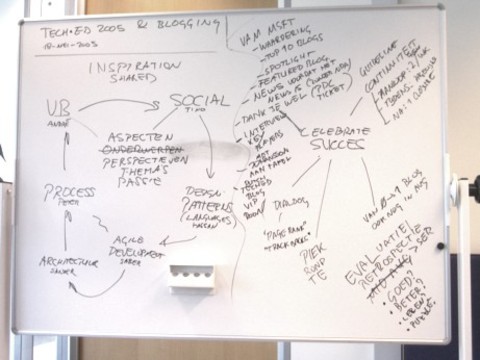We krijgen waarschijnklijk een klein stapeltje Tech•Ed kaarten beschikbaar die reeds geregistreerde mensen weg kunnen geven aan anderen onder bepaalde voorwaarden. Details verwacht ik vóór woensdag 8 juni. Blijf scherp en hou deze blog in de gaten.
Bloggers met journalistenstatus
Bloggers als journalisten tijdens Tech-Ed? We onderzoeken op dit moment of dat tot de mogelijkheden behoort. Heeft wel wat haken en ogen en schept mogelijk een precedent, maar behoort zeker tot de mogelijkheden. De samenwerking hierover met Perlita Fränkel en Renée Reijers van Monogram Communication Strategies (MCS) en het Tech•Ed EMEA team verloopt in ieder geval prima. Later meer.
Reasons to Train—To Save Money
| to | improve total quality |
| to | ensure maximum uptime |
| to | lower cost of ownership |
| to | increase ROI |
| to | improve security |
| to | prevent schedule and budget overruns |
| to | create more cost-effective solutions |
| to | reduce losses |
| to | reduce cost of business |
| to | prevent law suits |
| to | prevent or reduce problems |
| to | reduce support efforts |
| to | prevent or reduce expensive service calls |
| to | avoid travel and lodging costs (it’s in Amsterdam) |
Ja ja. Bloggen over Tech•Ed krijgt de aandacht op de officiële website in de sectie over Community & Networking Opportunities. Cool. Ik wens je een zonnig en plezierig weekend.
Reasons to Train—To Make Money
Training makes money…
| to | accelerate productivity |
| to | meet project deadlines |
| to | create competetive advantage of technology potential |
| to | meet project deadlines |
| to | sustain and increase performance levels |
| to | keep customers (from switching to the competition) |
| to | understand how to use technology effectively |
| to | drive results |
| to | improve agility |
| to | do a better job |
| to | be able to enter new markets |
| to | create more effective solutions |
| to | comply with government requirements |
De Verhalenverteller
Aspecten en Perspectieven
Aspecten en Perspectieven
Over welke onderwerpen schrijven we als we het over Tech•Ed hebben. Er zijn dit jaar twaalf tracks. Je vastknopen aan een track spreekt eigenlijk niemand aan. Al discussiërend komen we veel meer op aspecten en perspectieven. Met andere woorden, met welke bril kijk je de wereld in en doe je je verslag?
Al snel komen een aantal boeiende aspecten bovendrijven en bieden zich spontaan gepassioneerde brillendragers aan:
- Visual Basic—André Obelink
- Sociale aspecten—Tino Donderwinkel
- Ontwikkelprocessen—Peter Mazereeuw
- Architectuur—Sander Gerz
- Agile Development—Saber Karmous
- Design Patterns—Hassan Fadili
Hoezo, Inspiration Shared?
Compenseer Succes
Compenseer Succes
Tja, toch maar weer een wat engelse tekst. Compensate Succes is een niet te missen Organizational Pattern. We zijn als club van acht voor de eerste keer bij elkaar geweest. We gaan straks aan de slag met bloggen voor, tijdens en na Tech•Ed. Hoe weten we en meten we succes? Wanneer zijn we blij en tevreden een maand of twee na Tech-Ed? Ah, wel, de volgende ideeëen komen bovendrijven.
Een zinnige blog biedt continuïteit. ‘t Is niet een enkele piekinspanning in het begin en die na een dag of twee al weer afzakt. Bloggen kost tijd en inzet. Voor het bloggen over Tech•Ed hebben worden we aangespoord door de volgende richtlijnen:
- blogloze deelnamers maken hun eerste blog;
- in aanloop naar Tech•Ed per week gemiddeld twee blog entries;
- tijdens Tech•Ed dagelijks (meerdere) blog entries;
- direct na Tech•Ed een enkele afsluitende blog entry;
Zelf-redactie en discipline.
Hoe meet je dat dan? vraag je je misschien af. Wij ook. In eerste instantie doen we “the simplest thing that can possibly work”:
- We verwachten een piek in het bezoek tijdens Tech•Ed.
- We kijken we naar “page ranks”, “track backs” en met name naar kruisverwijzingen.
- We doen een retrospectie na afloop.
Het is en blijft tenslotte een experiment en geen fundamenteel wetenschappelijk onderzoek.
Tijdens de retrospectie in de tweede helft van augustus vragen we ons af:
- Wat ging er goed?
- Wat kan er beter?
- Wat hebben we geleerd?
- Wat puzzelt ons nog?
Waarmee compenseren we succes? Bijvoorbeeld met:
- Waardering in de vorm van presentje. Dank je wel.
- Een plek in de top 10 blogs.
- Jouw blog in de spotlight (“Featured Blog”).
- Interviews met sleutelspelers van Microsoft Engineering.
- Tijdens Tech•Ed exclusief aan tafel met hotshots en VIPs.
- Toegang tot nieuws voordat het nieuws is.
Ik heb de consensus van de bevlogen en zinnige brainstorm en dialoog over de etikette samengevat als een lijst van wat we wel en niet “moeten, mogen en kunnen”. “Moeten” klinkt natuurlijk zeer dwingend. En dat is het ook. Hier ga je…
| Je moet | respect tonen voor de ander. |
| Je moet | actief schrijven, in de tegenwoordige tijd. Zo hou je je lezer geboeid. |
| Je moet | actuele zaken beschrijven. Maak nieuws voordat het nieuws is. |
| Je kan | foto’s meenemen in je blog. Altijd koel. |
| Je kan | podcasting overwegen. Hoe dat technisch gerealiseerd kan worden moet nog worden uitgezocht. |
| Je moet | voor Tech-Ed deelnemers relevante informatie bieden. Als je teveel afdwaald, kan je beter een andere blog starten. |
| Je kan | jouw ervaring over sociale aspecten en de gemeenschap (“community”) geven. Geef het een persoonlijk tintje. |
| Je moet | prikkelend en uitdagend schrijven. Of je verliest je publiek. |
| Je kan | stelling nemen. Prikkel. |
| Je moet | tijdig reageren op opmerkingen of vragen van anderen. Een responsetijd van een werkdag wordt op prijs gesteld. |
| Je kan | de dialoog opzoeken met de ander. Maak een web van dialoogdraden. Monologen zijn dodelijk. |
| Je kan | je kritisch opstellen. |
| Je kan | technich zo diep gaan als je wilt. Zorg ervoor dat ze bij je blijven. |
| Je moet | de nederlandse taal de voorkeur geven. Het is tenslotte een Nederlandse Tech-Ed gemeenschap. Engels is echter niet verboden. |
| Je kan | puntig schrijven zodat je lezer de aandacht erbij kan houden. |
| Je mag | niet bashen. Dat is respectloos, voegt weinig toe en leidt meestal niet tot zinnige dialoog maar juist tot polarisatie. |
| Je mag | niet vloeken. |
| Je mag | niet discrimineren (in de negatieve zin). |
| Je mag | geen pornografische uitingen publiceren (tekst, foto, anders). |
| Je mag | geen schaamteloze productpromoties ventileren. En probeer naar marketing riekende uitingen tot een minumum te beperken. |
| Je kan | je afvragen of een letterlijke transcript van een sessie zinnig is voor een blog. Publiceer die elders en verwijs ernaar. |
| Je kan | je afvragen of een volledig en persoonlijk dagboek gewaardeerd wordt. De tijd zal het leren. |
Tech•Ed 2005 en blogging
Prima sessie gehad op Schiphol-Rijk met Hassan Fadili, Saber Karmous, Peter Mazereeuw, Andre Obelink, Tino Donderwinkel, Sander Gerz en Gerard Verbrugge over Tech•Ed en blogging. Na een korte intro over Tech•Ed direkt de brainstorm in.
De eerste brainstorm gaat primair over wat we wel en wat we niet willen dat er gebeurd in de blogs. Zeg maar de ethische kant en de etiquette. Daarover later meer. Dan komen Gerard’s pizza’s binnen en staan we al knoeiend een paar lekkere pizzapunten naar binnen te werken. Ook de onderwerpen waarover we willen bloggen komen aan bod. Blijkt wat moeilijk te zijn om concreet onderwerpen te bepalen. We komen uiteindelijk uit op aspecten en perspectieven. Dus veel meer: met welke bril kijk je naar Tech•Ed en blog je vervolgens? Tenslotte geboomd over celebrate success. Wanneer vinden we onze inspanningen succesvol?
Kortom, een zinnige avond met veel lachen en weer nieuwe netwerkverbindingen.
Tech•Ed Europe 2005, RAI
Ook dit jaar is Tech•Ed in de Amsterdam RAI, en wel van 5-8 juli 2005. Ook dit jaar zullen meer dan 6.000 software ontwikkelaars en IT professionals zich onderdompelen in vier dagen technische training. En ik ben de Tech•Ed Champion voor de Nederlandse deelnemers, net zoals vorig jaar. Het thema? Inspiration Shared. Community en blogging hebben de aandacht. Wat gaat dit jaar nog meer brengen?
Now that FOAF and FOAFnet give the opportunity to set new standards to interchange entire social network profiles and gain momentum, it seems like the right moment to fix a long standing omission in the naming scheme of people.
Ever since software took over the administrative work from human beings, this software has only captured firstname and surname, and, in some cases, middlename. Especially in the US, it’s only firstname and surname. In Europe, it’s a bit different.
In Europe, and possibly other places, many people also have a surnamePrefix like “van”, “van de”, “van der” (Holland, Belgium), “von”, “von der” (Germany), “de”, “de la” (France), etc. Most IT systems and websites do not support these surnamePrefixes.
Not being able to express your Surname feels like missing a part of your identity (small but significant). I once was told the story that Andreas von Bechtolsheim, one of the founders of Sun Microsystems, missed his plane because he was late and they could not find his ticket under ‘B’ (for Bechtolsheim). They found his ticket under ‘V’ (for Vonbechtolsheim), albeit too late. That was the day he conformed to the system (rather than the other way around) and changed his name to Andy Bechtolsheim.
Now is the time to add the following entry to the FOAF specs:
Property: foaf:surnamePrefix
surnamePrefix – the surname prefix of some person
Status: draft
Domain:foaf:Person
Range: http://www.w3.org/2000/01/rdf-schema#Literal
The foaf:surnamePrefix and foaf:surnameRoot together form foaf:surname. However, use only foaf:surnameRoot for sorting.
Also see http://www.addressstandard.com/ (European initiative to standardize postal addresses).
Luistert u vooral tussen de regels door.
Op het puntje van zijn stoel kijkt Rildrik-Jan van der Wiel uit Hendrik Ido Ambacht naar aflevering 33 van het VPRO-programma Noorderlicht. Dit keer gaat het over natuurlijke constructies en strukturen. Boeiend, boeiend.
The Virtual Community, Howard Rheingold
The Virtual Community, Homesteading on the Electronic Frontier; Howard Rheingold (Author of Virtual Reality), Addison-Wesley Publishing Company.
ISBN 0-201-60870-7, $22.95
The Virtual Community by Howard Rheingold covers all aspects from a globally connected community. He starts at his participation in the WELL (Whole Earth ‘Lectronic Link), one of the first electronic virtual communities, and the social impact it had on his life and that of his family. Virtual communities can discuss very intimate topics, like leukemia for instance, that cause the whole virtual community to feel what’s going on at one of the member’s home. Even the virtual death of WELLite Blair Newman, removing–scribbling–every word he ever said, as well as Blair’s real death by suicide and its emotional consequences is discussed.
The complete history of the Net is discussed in length, from ARPANET to NREN, including the current explosion of the Internet. Bill Clinton and Al Gore play their roles too, of course. Media like Gopher and Usenet complete the picture, although WWW and Mosaic are not mentioned, probably because they emerged after this book got published. Not to be forgotten are the grassroot BBSs, small, cheap and simple virtual communities that are self-propagating and difficult to eradicate.
However, MUDs (Mutli User Dungeons)–imaginary worlds in computer databases where people make up their own world, rules and objects, yes, even magic–appear to be very addictive. One example mentions a addict “who managed to maintain a B average as an undergraduate, hold down a part-time job, and still find time to MUD for seventy hours a week or more.” In a more interesting variant of MUDs, MUSEs (Multi-User Simulation Environments), everyone is granted powers to shape the environment, not just wizards. MicroMUSE created Cyberion City, in which players build their own, complete environment by exploring and playing with it–here, playing is a powerful form of learning. “Dying” in a MUD–because you got shot by someone else, say–is experienced as a very emotional event, similar to the corresponding real life experience.
IRCs (Internet Relay Chat) are also MUD-like in the sense that they create a channel (i.e. “dungeon”) on which many people listen in and discuss and pose questions, “gesturing” and emoting by using the appropriate verbs. Here too, social behaviour plays a very important role
Then Rheingold discusses virtual communities and grassroots activities throughout Japan (COARA, TWICS), England (CIX) and France (Minitel, messageries rose), finding that at around the same time, various virtual communities emerged worldwide. And that these communities now tend to drift towards Internet and use it as the foundation for all communication.
In the section on Electronic Frontiers and Online Activists, Rheingold covers the history of Dave Hughes and his involvement in the Net. Then switches to the birth of the Electronic Frontier Foundation to fight hackers and intruders that endanger the life on the Net in various communities. This section mentions “Within days of the Pinedale meeting [where the EFF was founded], Steve Wozniak, cofounder of Apple
Computer, and John Gilmore, Unix telecommunications wizard and one of the first employees of the enourmously successful Sun Microsystems, offered to match Kapor’s [cofounder of Lotus] initial contributions.”
Also, application of new and emerging technologies, like high bandwidth networks, cause telecommunication companies, cable providers, entertainment companies, and computer companies to invest huge sums of money in developing and architecting the technology for video-on-demand applications. Joint ventures happen weekly, and even Apple and IBM joined forces and started Kaleida Labs. Everyone wants a slice of the pie, and Microsoft wants to put its own low-orbit sattelites into place.
Finally, Rheingold delves into “disinformacy” in which extreme evolutions of the Net into the future are discussed. One one side, the Net remains a free, democratic and organized chaos, but with some laws enforced to keep it habitable. On the other side, the Net turns into the ultimate prison (the Panopticon) in which “tyrants could use surveillance technologies to wield power.” Big Brother Extreme. The Net uses infromation about you to sell to others, maybe even blackmail you.
Rheingold ends with: “Armed with knowledge, guided by a clear, human-centered vision, governed by a commitment to civil discourse, we the citizens hold the lever at a pivotal time. What happens next is largely up to us.”
Personal notes
It seems to me that the building features of MUSEs can be very powerful, and very atractive to employ in a business environment. Combining this building feature of MUSEs with a visualization through realistic 3-D rendering by virtual reality can create the next computer revolution. It may well be one of the ways we can manage the huge amount information thrown at us every day of our life.
Powerful and affordable computer technology is becoming availabe to make these applications feasable to build and employ. That is, with the current processing power of a SPARCstation 20, combined with cheap SX/ZX-like (and beyond…) graphics power and ATM-like network bandwidth, highly visualized MUBEs (Multi-User Business Environments) come in reach.
Yet again, Sun is hardly mentioned in Rheingold’s book (only twice). In my perception however, Sun systems largely make up the worldwide backbone of the Internet (more than 80%?). Perhaps I’m wrong, or maybe I don’t read the right books. Also, the PC community (DOS, Windows and Macintosh) seems to take over the credits of the Internet explosion, not us.
Yet again, I think we must leverage (market) the fact that Sun’s products form the core of the Internet revolution! We fail to do so until now. This frustrates me.However, get this book (if you don’t have it already) and add it to your standard reading list
Regards,
Martien van Steenbergen.
